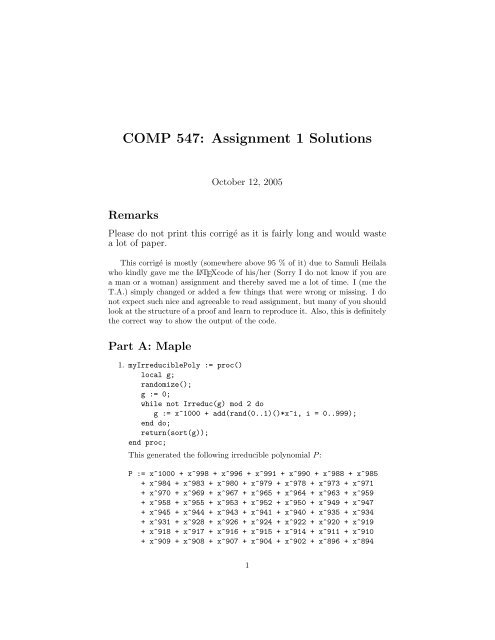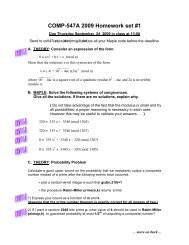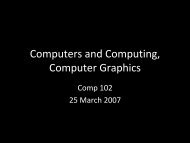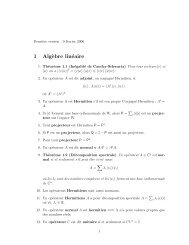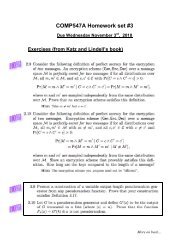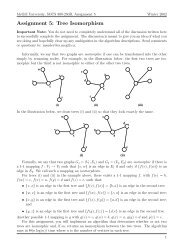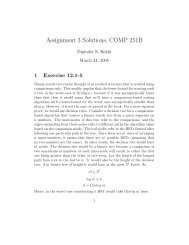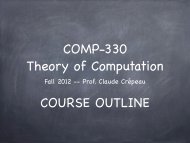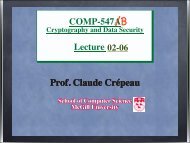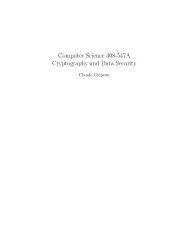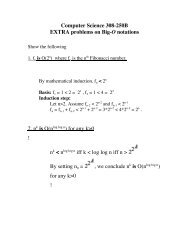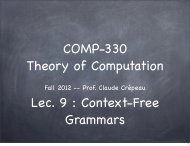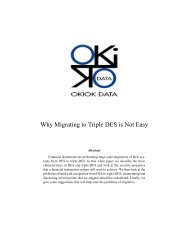COMP 547: Assignment 1 Solutions
COMP 547: Assignment 1 Solutions
COMP 547: Assignment 1 Solutions
Create successful ePaper yourself
Turn your PDF publications into a flip-book with our unique Google optimized e-Paper software.
<strong>COMP</strong> <strong>547</strong>: <strong>Assignment</strong> 1 <strong>Solutions</strong><br />
October 12, 2005<br />
Remarks<br />
Please do not print this corrigé as it is fairly long and would waste<br />
a lot of paper.<br />
This corrigé is mostly (somewhere above 95 % of it) due to Samuli Heilala<br />
who kindly gave me the L A TEXcode of his/her (Sorry I do not know if you are<br />
a man or a woman) assignment and thereby saved me a lot of time. I (me the<br />
T.A.) simply changed or added a few things that were wrong or missing. I do<br />
not expect such nice and agreeable to read assignment, but many of you should<br />
look at the structure of a proof and learn to reproduce it. Also, this is definitely<br />
the correct way to show the output of the code.<br />
Part A: Maple<br />
1. myIrreduciblePoly := proc()<br />
local g;<br />
randomize();<br />
g := 0;<br />
while not Irreduc(g) mod 2 do<br />
g := x^1000 + add(rand(0..1)()*x^i, i = 0..999);<br />
end do;<br />
return(sort(g));<br />
end proc;<br />
This generated the following irreducible polynomial P :<br />
P := x^1000 + x^998 + x^996 + x^991 + x^990 + x^988 + x^985<br />
+ x^984 + x^983 + x^980 + x^979 + x^978 + x^973 + x^971<br />
+ x^970 + x^969 + x^967 + x^965 + x^964 + x^963 + x^959<br />
+ x^958 + x^955 + x^953 + x^952 + x^950 + x^949 + x^947<br />
+ x^945 + x^944 + x^943 + x^941 + x^940 + x^935 + x^934<br />
+ x^931 + x^928 + x^926 + x^924 + x^922 + x^920 + x^919<br />
+ x^918 + x^917 + x^916 + x^915 + x^914 + x^911 + x^910<br />
+ x^909 + x^908 + x^907 + x^904 + x^902 + x^896 + x^894<br />
1
+ x^893 + x^892 + x^891 + x^890 + x^889 + x^886 + x^884<br />
+ x^883 + x^881 + x^879 + x^875 + x^874 + x^873 + x^872<br />
+ x^871 + x^868 + x^865 + x^864 + x^863 + x^861 + x^859<br />
+ x^858 + x^855 + x^854 + x^853 + x^850 + x^848 + x^842<br />
+ x^841 + x^836 + x^834 + x^832 + x^831 + x^830 + x^828<br />
+ x^827 + x^824 + x^823 + x^820 + x^818 + x^817 + x^816<br />
+ x^815 + x^810 + x^804 + x^800 + x^799 + x^798 + x^796<br />
+ x^793 + x^792 + x^790 + x^787 + x^786 + x^784 + x^783<br />
+ x^782 + x^776 + x^774 + x^771 + x^770 + x^765 + x^764<br />
+ x^761 + x^759 + x^758 + x^757 + x^756 + x^755 + x^754<br />
+ x^752 + x^747 + x^744 + x^743 + x^741 + x^740 + x^738<br />
+ x^736 + x^735 + x^731 + x^729 + x^727 + x^726 + x^725<br />
+ x^723 + x^719 + x^718 + x^716 + x^714 + x^713 + x^709<br />
+ x^708 + x^705 + x^704 + x^703 + x^702 + x^698 + x^696<br />
+ x^695 + x^693 + x^692 + x^690 + x^688 + x^686 + x^684<br />
+ x^683 + x^680 + x^679 + x^678 + x^675 + x^673 + x^672<br />
+ x^670 + x^666 + x^665 + x^664 + x^663 + x^660 + x^659<br />
+ x^658 + x^656 + x^655 + x^654 + x^652 + x^650 + x^649<br />
+ x^648 + x^647 + x^645 + x^644 + x^642 + x^639 + x^638<br />
+ x^634 + x^633 + x^632 + x^631 + x^629 + x^628 + x^622<br />
+ x^620 + x^617 + x^616 + x^615 + x^614 + x^610 + x^609<br />
+ x^606 + x^604 + x^602 + x^597 + x^595 + x^592 + x^588<br />
+ x^587 + x^586 + x^585 + x^583 + x^582 + x^581 + x^577<br />
+ x^575 + x^574 + x^572 + x^571 + x^570 + x^567 + x^566<br />
+ x^565 + x^563 + x^562 + x^561 + x^560 + x^558 + x^557<br />
+ x^556 + x^553 + x^552 + x^551 + x^550 + x^545 + x^544<br />
+ x^543 + x^541 + x^538 + x^536 + x^533 + x^532 + x^531<br />
+ x^529 + x^525 + x^524 + x^523 + x^522 + x^518 + x^515<br />
+ x^514 + x^512 + x^510 + x^509 + x^507 + x^506 + x^504<br />
+ x^500 + x^497 + x^496 + x^493 + x^492 + x^491 + x^490<br />
+ x^489 + x^488 + x^487 + x^484 + x^481 + x^477 + x^475<br />
+ x^474 + x^471 + x^470 + x^469 + x^468 + x^467 + x^466<br />
+ x^464 + x^461 + x^460 + x^459 + x^458 + x^456 + x^455<br />
+ x^454 + x^452 + x^451 + x^449 + x^448 + x^446 + x^445<br />
+ x^443 + x^438 + x^437 + x^433 + x^431 + x^428 + x^426<br />
+ x^423 + x^420 + x^417 + x^416 + x^415 + x^414 + x^413<br />
+ x^412 + x^411 + x^408 + x^406 + x^404 + x^402 + x^400<br />
+ x^399 + x^398 + x^396 + x^395 + x^394 + x^393 + x^391<br />
+ x^388 + x^387 + x^386 + x^385 + x^384 + x^383 + x^379<br />
+ x^378 + x^376 + x^372 + x^371 + x^364 + x^363 + x^362<br />
+ x^361 + x^358 + x^357 + x^356 + x^355 + x^354 + x^353<br />
+ x^350 + x^347 + x^345 + x^343 + x^342 + x^340 + x^339<br />
+ x^337 + x^336 + x^335 + x^332 + x^331 + x^327 + x^324<br />
+ x^316 + x^314 + x^312 + x^311 + x^308 + x^303 + x^302<br />
+ x^301 + x^300 + x^297 + x^296 + x^295 + x^294 + x^292<br />
+ x^288 + x^285 + x^284 + x^283 + x^280 + x^279 + x^278<br />
2
+ x^277 + x^276 + x^275 + x^272 + x^269 + x^268 + x^260<br />
+ x^259 + x^258 + x^257 + x^254 + x^252 + x^250 + x^248<br />
+ x^244 + x^243 + x^242 + x^239 + x^238 + x^237 + x^236<br />
+ x^235 + x^232 + x^231 + x^229 + x^228 + x^226 + x^225<br />
+ x^222 + x^221 + x^218 + x^216 + x^211 + x^210 + x^209<br />
+ x^208 + x^206 + x^204 + x^202 + x^200 + x^197 + x^196<br />
+ x^193 + x^192 + x^188 + x^182 + x^180 + x^179 + x^178<br />
+ x^177 + x^175 + x^174 + x^173 + x^171 + x^170 + x^167<br />
+ x^163 + x^159 + x^158 + x^157 + x^155 + x^153 + x^152<br />
+ x^150 + x^149 + x^148 + x^146 + x^145 + x^143 + x^142<br />
+ x^141 + x^140 + x^139 + x^137 + x^136 + x^135 + x^131<br />
+ x^129 + x^128 + x^127 + x^125 + x^124 + x^123 + x^121<br />
+ x^120 + x^119 + x^118 + x^116 + x^114 + x^113 + x^110<br />
+ x^105 + x^104 + x^103 + x^102 + x^100 + x^99 + x^97<br />
+ x^94 + x^90 + x^83 + x^81 + x^79 + x^78 + x^75 + x^72<br />
+ x^71 + x^69 + x^68 + x^64 + x^61 + x^58 + x^56 + x^55<br />
+ x^54 + x^50 + x^48 + x^45 + x^44 + x^43 + x^42 + x^40<br />
+ x^39 + x^37 + x^36 + x^35 + x^34 + x^32 + x^31 + x^30<br />
+ x^24 + x^23 + x^22 + x^21 + x^20 + x^18 + x^17 + x^16<br />
+ x^14 + x^13 + x^11 + x^9 + x^8 + x^2 + 1;<br />
The problem with Maple’s Randpoly and Randprime functions is that they<br />
use a random number generator seed that cannot be manually set. Thus,<br />
the sequence of generated “random” polynomials is always the same from<br />
one Maple session to another. To demonstrate this, proceed as follows:<br />
(NB: These results were obtained with Maple 9. I make no claims concerning<br />
other versions of Maple.)<br />
(a) Start a Maple session.<br />
(b) Run y := Randpoly(1000, x) mod 2; and save the output with<br />
save y, tmp1;.<br />
(c) Exit Maple and start another Maple session.<br />
(d) Set the global random number generator seed to a number based on<br />
the system clock with randomize();.<br />
(e) Run y := Randpoly(1000, x) mod 2; and save the output with<br />
save y, tmp2;.<br />
(f) Exit Maple.<br />
(g) Compare the two files tmp1 and tmp2. On a Unix-like system this is<br />
best done with diff tmp1 tmp2. This reveals that the two “random”<br />
polynomials are, in fact, identical.<br />
Unfortunately, Randprime and Randpoly do not use the global random<br />
number generator seed, which can be set with randomize. There is no<br />
function such as Randomize (capitalised) that would allow the user to set<br />
the random number generator seed used by Randpoly and Randprime. In<br />
3
all functions I wrote for this assignment, I used the randomize function<br />
to set the seed used by functions such as rand to a number that is based<br />
on the system clock. Although my random numbers are still deterministically<br />
computed, they are, in a sense, more random and more difficult to<br />
randomly reproduce.<br />
But there is worst, the random generator Randpoly is not very good and<br />
loops around quite quickly. You could not, in fact generate the entire field.<br />
2. To build the field F 2 1000 using P , one must use Maple’s GF function:<br />
F21000 := GF(2, 1000, P);<br />
This generated the following output:<br />
F21000 := module () export +, -, *, /, ^, input, output,<br />
inverse, extension, variable, factors, norm, trace, order,<br />
random, size, isPrimitiveElement, PrimitiveElement,<br />
ConvertIn, ConvertOut, zero, one, init; end module<br />
3. myFindPrim := proc(Field)<br />
local factors, m, f, g, i;<br />
randomize();<br />
factors := [31, 601, 4710883168879506001, 269089806001,<br />
1801, 3, 11, 251, 229668251, 5519485418336288303251,<br />
4051, 5, 94291866932171243501, 268501, 28001, 96001,<br />
41, 101, 47970133603445383501, 3775501, 7001, 8101, 17,<br />
61681, 401, 3173389601, 2787601, 340801, 8877945148742\<br />
945001146041439025147034098690503591013177336356694416\<br />
517527310181938001, 4001, 1074001, 2020001, 22624001,<br />
1481124532001];<br />
m := [seq((2^1000 - 1)/factors[i], i = 1..34)];<br />
f := 0;<br />
while f = 0 do<br />
f := 1;<br />
g := Field[input](rand(0..2^1000-1)());<br />
for i from 1 to 34 do<br />
if Field[‘^‘](g, m[i]) = Field[one] then<br />
f := 0;<br />
break;<br />
end if<br />
end do;<br />
end do;<br />
return(g);<br />
end proc;<br />
This generated the following primitive element g:<br />
4
g := x^997 + x^996 + x^994 + x^991 + x^990 + x^988 + x^985<br />
+ x^976 + x^974 + x^973 + x^971 + x^968 + x^966 + x^965<br />
+ x^963 + x^962 + x^960 + x^959 + x^958 + x^957 + x^954<br />
+ x^953 + x^952 + x^951 + x^949 + x^948 + x^947 + x^944<br />
+ x^943 + x^940 + x^939 + x^936 + x^932 + x^931 + x^929<br />
+ x^927 + x^926 + x^925 + x^923 + x^920 + x^919 + x^917<br />
+ x^915 + x^914 + x^913 + x^911 + x^908 + x^907 + x^904<br />
+ x^902 + x^901 + x^899 + x^898 + x^896 + x^894 + x^893<br />
+ x^891 + x^890 + x^887 + x^883 + x^879 + x^878 + x^876<br />
+ x^875 + x^873 + x^870 + x^869 + x^865 + x^862 + x^861<br />
+ x^860 + x^857 + x^854 + x^853 + x^849 + x^847 + x^846<br />
+ x^844 + x^840 + x^837 + x^834 + x^833 + x^830 + x^829<br />
+ x^828 + x^826 + x^824 + x^823 + x^821 + x^820 + x^819<br />
+ x^818 + x^817 + x^815 + x^814 + x^813 + x^810 + x^809<br />
+ x^808 + x^807 + x^806 + x^804 + x^803 + x^802 + x^801<br />
+ x^799 + x^798 + x^797 + x^796 + x^795 + x^794 + x^792<br />
+ x^790 + x^787 + x^785 + x^784 + x^783 + x^782 + x^781<br />
+ x^780 + x^779 + x^778 + x^777 + x^775 + x^774 + x^772<br />
+ x^771 + x^770 + x^767 + x^764 + x^761 + x^755 + x^753<br />
+ x^752 + x^751 + x^750 + x^748 + x^747 + x^746 + x^745<br />
+ x^744 + x^742 + x^741 + x^740 + x^736 + x^733 + x^732<br />
+ x^731 + x^729 + x^728 + x^726 + x^725 + x^723 + x^720<br />
+ x^719 + x^717 + x^716 + x^715 + x^712 + x^710 + x^709<br />
+ x^706 + x^704 + x^701 + x^700 + x^698 + x^695 + x^694<br />
+ x^689 + x^688 + x^682 + x^679 + x^672 + x^670 + x^668<br />
+ x^667 + x^660 + x^659 + x^658 + x^657 + x^656 + x^653<br />
+ x^650 + x^649 + x^648 + x^647 + x^646 + x^645 + x^642<br />
+ x^639 + x^636 + x^634 + x^633 + x^632 + x^630 + x^629<br />
+ x^627 + x^623 + x^622 + x^617 + x^612 + x^608 + x^606<br />
+ x^601 + x^600 + x^599 + x^598 + x^594 + x^593 + x^591<br />
+ x^590 + x^587 + x^586 + x^585 + x^584 + x^583 + x^581<br />
+ x^580 + x^579 + x^578 + x^577 + x^576 + x^575 + x^570<br />
+ x^569 + x^568 + x^566 + x^565 + x^564 + x^563 + x^561<br />
+ x^559 + x^557 + x^554 + x^553 + x^552 + x^550 + x^548<br />
+ x^<strong>547</strong> + x^544 + x^543 + x^541 + x^540 + x^539 + x^537<br />
+ x^535 + x^534 + x^532 + x^529 + x^528 + x^527 + x^526<br />
+ x^521 + x^518 + x^517 + x^516 + x^514 + x^511 + x^510<br />
+ x^508 + x^507 + x^506 + x^505 + x^504 + x^503 + x^502<br />
+ x^501 + x^500 + x^498 + x^494 + x^493 + x^490 + x^489<br />
+ x^488 + x^486 + x^484 + x^483 + x^482 + x^480 + x^478<br />
+ x^474 + x^473 + x^469 + x^468 + x^466 + x^461 + x^459<br />
+ x^456 + x^454 + x^450 + x^448 + x^447 + x^446 + x^444<br />
+ x^443 + x^439 + x^435 + x^434 + x^433 + x^431 + x^430<br />
+ x^426 + x^425 + x^424 + x^422 + x^418 + x^417 + x^413<br />
+ x^410 + x^409 + x^404 + x^403 + x^402 + x^400 + x^397<br />
+ x^395 + x^394 + x^393 + x^391 + x^390 + x^389 + x^384<br />
5
+ x^383 + x^382 + x^381 + x^379 + x^378 + x^377 + x^376<br />
+ x^375 + x^373 + x^372 + x^369 + x^368 + x^365 + x^363<br />
+ x^359 + x^356 + x^354 + x^351 + x^350 + x^347 + x^346<br />
+ x^345 + x^343 + x^338 + x^335 + x^332 + x^330 + x^328<br />
+ x^327 + x^326 + x^324 + x^322 + x^320 + x^319 + x^316<br />
+ x^315 + x^313 + x^312 + x^311 + x^310 + x^308 + x^306<br />
+ x^305 + x^302 + x^300 + x^299 + x^298 + x^297 + x^296<br />
+ x^291 + x^287 + x^286 + x^284 + x^283 + x^279 + x^275<br />
+ x^274 + x^273 + x^272 + x^271 + x^270 + x^266 + x^265<br />
+ x^264 + x^263 + x^260 + x^258 + x^254 + x^253 + x^252<br />
+ x^251 + x^250 + x^246 + x^243 + x^239 + x^235 + x^234<br />
+ x^231 + x^229 + x^227 + x^225 + x^223 + x^222 + x^217<br />
+ x^213 + x^212 + x^208 + x^207 + x^205 + x^200 + x^199<br />
+ x^198 + x^197 + x^194 + x^193 + x^192 + x^190 + x^189<br />
+ x^186 + x^185 + x^184 + x^178 + x^177 + x^176 + x^174<br />
+ x^173 + x^172 + x^170 + x^166 + x^165 + x^163 + x^162<br />
+ x^160 + x^159 + x^158 + x^156 + x^154 + x^153 + x^150<br />
+ x^147 + x^143 + x^142 + x^140 + x^138 + x^137 + x^136<br />
+ x^135 + x^134 + x^132 + x^131 + x^129 + x^127 + x^125<br />
+ x^118 + x^110 + x^109 + x^106 + x^104 + x^103 + x^102<br />
+ x^100 + x^97 + x^96 + x^93 + x^91 + x^89 + x^82 + x^79<br />
+ x^78 + x^77 + x^76 + x^75 + x^72 + x^70 + x^68 + x^66<br />
+ x^65 + x^63 + x^62 + x^61 + x^60 + x^56 + x^54 + x^53<br />
+ x^52 + x^51 + x^50 + x^43 + x^42 + x^34 + x^33 + x^28<br />
+ x^27 + x^24 + x^21 + x^20 + x^19 + x^14 + x^13 + x^12<br />
+ x^10 + x^9 + x^7 + x^4 + x^3 + x;<br />
4. To generate two random elements i, j from F 2 1000, use the primitive element<br />
g from above:<br />
randomize();<br />
x := rand(0..2^1000)();<br />
y := x;<br />
while y = x do<br />
y := rand(0..2^1000)();<br />
end do;<br />
if x=2^1000 then<br />
i=0;<br />
else<br />
i := F21000[‘^‘](g, x);<br />
endif<br />
if y=2^1000 then<br />
j=0;<br />
else<br />
j := F21000[‘^‘](g, y);<br />
endif<br />
6
We know that the distinct powers of a primitive element enumerate all the<br />
distinct elements in our field. In particular, as long as our x, y are distinct<br />
and randomly selected, the generated i, j will be distinct and randomly<br />
selected. We only need take care of the zero polynomial exception.<br />
The above code generated the following i, j pair:<br />
i := x^998 + x^995 + x^993 + x^990 + x^988 + x^986 + x^985<br />
+ x^983 + x^982 + x^979 + x^976 + x^970 + x^964 + x^962<br />
+ x^960 + x^959 + x^957 + x^953 + x^950 + x^948 + x^944<br />
+ x^943 + x^942 + x^941 + x^940 + x^938 + x^936 + x^933<br />
+ x^931 + x^930 + x^926 + x^924 + x^923 + x^922 + x^921<br />
+ x^919 + x^918 + x^915 + x^914 + x^908 + x^907 + x^906<br />
+ x^904 + x^902 + x^900 + x^898 + x^897 + x^894 + x^893<br />
+ x^889 + x^888 + x^886 + x^877 + x^873 + x^872 + x^871<br />
+ x^870 + x^869 + x^867 + x^865 + x^863 + x^861 + x^859<br />
+ x^854 + x^851 + x^849 + x^848 + x^847 + x^846 + x^843<br />
+ x^842 + x^841 + x^840 + x^839 + x^832 + x^830 + x^827<br />
+ x^826 + x^825 + x^824 + x^823 + x^822 + x^820 + x^819<br />
+ x^816 + x^815 + x^814 + x^813 + x^812 + x^811 + x^810<br />
+ x^809 + x^808 + x^807 + x^806 + x^805 + x^800 + x^798<br />
+ x^796 + x^795 + x^791 + x^787 + x^785 + x^784 + x^783<br />
+ x^782 + x^781 + x^780 + x^776 + x^774 + x^772 + x^770<br />
+ x^769 + x^768 + x^767 + x^766 + x^765 + x^763 + x^760<br />
+ x^759 + x^758 + x^755 + x^754 + x^752 + x^750 + x^749<br />
+ x^748 + x^747 + x^746 + x^745 + x^744 + x^743 + x^742<br />
+ x^741 + x^740 + x^737 + x^734 + x^733 + x^732 + x^730<br />
+ x^728 + x^726 + x^723 + x^719 + x^718 + x^715 + x^713<br />
+ x^712 + x^710 + x^705 + x^702 + x^701 + x^695 + x^693<br />
+ x^691 + x^690 + x^689 + x^686 + x^685 + x^682 + x^680<br />
+ x^679 + x^677 + x^675 + x^674 + x^672 + x^671 + x^668<br />
+ x^665 + x^664 + x^662 + x^659 + x^658 + x^656 + x^653<br />
+ x^645 + x^644 + x^643 + x^641 + x^638 + x^635 + x^634<br />
+ x^632 + x^631 + x^629 + x^627 + x^625 + x^624 + x^623<br />
+ x^622 + x^621 + x^619 + x^618 + x^617 + x^616 + x^613<br />
+ x^608 + x^607 + x^605 + x^604 + x^603 + x^599 + x^597<br />
+ x^595 + x^594 + x^592 + x^591 + x^590 + x^584 + x^581<br />
+ x^580 + x^578 + x^576 + x^574 + x^568 + x^567 + x^566<br />
+ x^564 + x^563 + x^559 + x^558 + x^557 + x^555 + x^553<br />
+ x^551 + x^550 + x^549 + x^546 + x^545 + x^543 + x^539<br />
+ x^538 + x^536 + x^533 + x^528 + x^527 + x^524 + x^521<br />
+ x^518 + x^517 + x^514 + x^512 + x^511 + x^507 + x^506<br />
+ x^503 + x^499 + x^498 + x^497 + x^495 + x^494 + x^492<br />
+ x^489 + x^487 + x^485 + x^484 + x^483 + x^482 + x^481<br />
+ x^480 + x^477 + x^475 + x^474 + x^473 + x^472 + x^471<br />
+ x^469 + x^468 + x^465 + x^463 + x^462 + x^461 + x^460<br />
+ x^459 + x^455 + x^454 + x^453 + x^450 + x^449 + x^447<br />
7
+ x^445 + x^443 + x^442 + x^440 + x^439 + x^437 + x^436<br />
+ x^435 + x^429 + x^427 + x^426 + x^423 + x^419 + x^418<br />
+ x^416 + x^412 + x^410 + x^409 + x^408 + x^405 + x^400<br />
+ x^398 + x^395 + x^394 + x^392 + x^390 + x^388 + x^387<br />
+ x^385 + x^384 + x^383 + x^382 + x^380 + x^374 + x^373<br />
+ x^371 + x^368 + x^367 + x^365 + x^363 + x^359 + x^358<br />
+ x^357 + x^356 + x^353 + x^348 + x^346 + x^345 + x^341<br />
+ x^338 + x^337 + x^336 + x^334 + x^331 + x^329 + x^324<br />
+ x^321 + x^319 + x^317 + x^313 + x^312 + x^310 + x^309<br />
+ x^307 + x^305 + x^303 + x^302 + x^301 + x^298 + x^297<br />
+ x^296 + x^291 + x^289 + x^282 + x^281 + x^279 + x^278<br />
+ x^276 + x^273 + x^270 + x^269 + x^267 + x^266 + x^265<br />
+ x^264 + x^261 + x^258 + x^256 + x^254 + x^252 + x^250<br />
+ x^249 + x^248 + x^246 + x^243 + x^242 + x^241 + x^240<br />
+ x^238 + x^230 + x^228 + x^225 + x^224 + x^222 + x^221<br />
+ x^220 + x^219 + x^218 + x^217 + x^215 + x^213 + x^211<br />
+ x^207 + x^203 + x^200 + x^196 + x^195 + x^194 + x^192<br />
+ x^189 + x^186 + x^185 + x^181 + x^180 + x^179 + x^175<br />
+ x^173 + x^168 + x^167 + x^166 + x^164 + x^163 + x^162<br />
+ x^161 + x^158 + x^156 + x^155 + x^153 + x^152 + x^149<br />
+ x^148 + x^146 + x^145 + x^144 + x^143 + x^142 + x^141<br />
+ x^139 + x^137 + x^135 + x^131 + x^129 + x^128 + x^127<br />
+ x^126 + x^122 + x^121 + x^115 + x^113 + x^112 + x^111<br />
+ x^110 + x^109 + x^107 + x^106 + x^104 + x^103 + x^99<br />
+ x^98 + x^97 + x^96 + x^95 + x^91 + x^89 + x^88 + x^87<br />
+ x^86 + x^83 + x^81 + x^77 + x^76 + x^74 + x^69 + x^66<br />
+ x^64 + x^63 + x^61 + x^58 + x^56 + x^55 + x^54 + x^52<br />
+ x^51 + x^50 + x^47 + x^46 + x^44 + x^42 + x^40 + x^38<br />
+ x^33 + x^30 + x^29 + x^27 + x^26 + x^25 + x^24 + x^22<br />
+ x^11 + x^10 + x^8 + x^7 + x^6 + x^5 + x^4 + x^3 + x^2;<br />
j := x^996 + x^995 + x^991 + x^988 + x^987 + x^985 + x^984<br />
+ x^983 + x^978 + x^975 + x^971 + x^966 + x^965 + x^964<br />
+ x^963 + x^962 + x^960 + x^959 + x^958 + x^954 + x^953<br />
+ x^952 + x^951 + x^949 + x^948 + x^946 + x^945 + x^944<br />
+ x^943 + x^937 + x^936 + x^934 + x^931 + x^930 + x^926<br />
+ x^923 + x^922 + x^919 + x^917 + x^915 + x^913 + x^912<br />
+ x^910 + x^909 + x^906 + x^904 + x^903 + x^902 + x^901<br />
+ x^896 + x^895 + x^893 + x^889 + x^888 + x^885 + x^884<br />
+ x^883 + x^882 + x^878 + x^876 + x^872 + x^871 + x^869<br />
+ x^867 + x^865 + x^864 + x^862 + x^861 + x^860 + x^857<br />
+ x^856 + x^855 + x^851 + x^846 + x^845 + x^843 + x^842<br />
+ x^840 + x^838 + x^837 + x^834 + x^832 + x^831 + x^830<br />
+ x^829 + x^827 + x^825 + x^824 + x^822 + x^818 + x^817<br />
+ x^815 + x^814 + x^813 + x^808 + x^805 + x^804 + x^801<br />
+ x^799 + x^798 + x^797 + x^794 + x^793 + x^792 + x^791<br />
8
+ x^790 + x^788 + x^784 + x^783 + x^782 + x^781 + x^780<br />
+ x^779 + x^775 + x^773 + x^770 + x^768 + x^766 + x^765<br />
+ x^763 + x^761 + x^760 + x^759 + x^753 + x^751 + x^740<br />
+ x^738 + x^737 + x^736 + x^735 + x^733 + x^729 + x^727<br />
+ x^726 + x^722 + x^720 + x^717 + x^716 + x^715 + x^714<br />
+ x^709 + x^706 + x^705 + x^704 + x^699 + x^698 + x^694<br />
+ x^688 + x^686 + x^685 + x^684 + x^681 + x^680 + x^677<br />
+ x^676 + x^672 + x^670 + x^669 + x^667 + x^666 + x^665<br />
+ x^664 + x^663 + x^661 + x^660 + x^656 + x^655 + x^654<br />
+ x^653 + x^652 + x^651 + x^648 + x^647 + x^644 + x^639<br />
+ x^638 + x^637 + x^636 + x^635 + x^632 + x^629 + x^628<br />
+ x^626 + x^623 + x^622 + x^620 + x^619 + x^616 + x^615<br />
+ x^610 + x^606 + x^605 + x^604 + x^599 + x^598 + x^596<br />
+ x^595 + x^594 + x^593 + x^592 + x^586 + x^583 + x^582<br />
+ x^581 + x^577 + x^576 + x^575 + x^574 + x^572 + x^570<br />
+ x^568 + x^565 + x^564 + x^563 + x^562 + x^556 + x^555<br />
+ x^552 + x^551 + x^549 + x^546 + x^545 + x^542 + x^539<br />
+ x^537 + x^519 + x^518 + x^517 + x^516 + x^513 + x^509<br />
+ x^508 + x^506 + x^505 + x^504 + x^503 + x^501 + x^500<br />
+ x^496 + x^494 + x^492 + x^491 + x^490 + x^488 + x^487<br />
+ x^484 + x^483 + x^482 + x^480 + x^479 + x^478 + x^477<br />
+ x^476 + x^475 + x^474 + x^473 + x^472 + x^470 + x^468<br />
+ x^466 + x^465 + x^463 + x^461 + x^459 + x^458 + x^455<br />
+ x^452 + x^448 + x^447 + x^446 + x^445 + x^444 + x^439<br />
+ x^436 + x^435 + x^430 + x^428 + x^426 + x^425 + x^424<br />
+ x^422 + x^420 + x^418 + x^417 + x^413 + x^412 + x^411<br />
+ x^410 + x^408 + x^407 + x^406 + x^404 + x^403 + x^401<br />
+ x^399 + x^397 + x^394 + x^393 + x^391 + x^384 + x^380<br />
+ x^378 + x^374 + x^373 + x^372 + x^369 + x^366 + x^364<br />
+ x^363 + x^360 + x^359 + x^357 + x^356 + x^355 + x^354<br />
+ x^351 + x^349 + x^348 + x^347 + x^346 + x^345 + x^344<br />
+ x^343 + x^342 + x^338 + x^335 + x^333 + x^330 + x^329<br />
+ x^328 + x^326 + x^324 + x^323 + x^319 + x^314 + x^311<br />
+ x^310 + x^307 + x^306 + x^301 + x^300 + x^296 + x^295<br />
+ x^294 + x^292 + x^285 + x^284 + x^281 + x^280 + x^279<br />
+ x^277 + x^275 + x^270 + x^268 + x^266 + x^265 + x^263<br />
+ x^262 + x^261 + x^258 + x^257 + x^256 + x^255 + x^253<br />
+ x^250 + x^249 + x^247 + x^246 + x^245 + x^244 + x^240<br />
+ x^235 + x^234 + x^232 + x^231 + x^229 + x^228 + x^227<br />
+ x^226 + x^225 + x^223 + x^222 + x^217 + x^216 + x^214<br />
+ x^212 + x^210 + x^207 + x^206 + x^203 + x^202 + x^201<br />
+ x^198 + x^197 + x^195 + x^194 + x^186 + x^184 + x^183<br />
+ x^182 + x^177 + x^173 + x^172 + x^171 + x^168 + x^165<br />
+ x^164 + x^162 + x^161 + x^157 + x^156 + x^154 + x^153<br />
+ x^149 + x^148 + x^145 + x^143 + x^142 + x^141 + x^140<br />
+ x^139 + x^138 + x^137 + x^136 + x^134 + x^133 + x^130<br />
9
+ x^127 + x^124 + x^122 + x^121 + x^119 + x^117 + x^114<br />
+ x^113 + x^109 + x^108 + x^106 + x^105 + x^104 + x^103<br />
+ x^101 + x^94 + x^92 + x^89 + x^86 + x^83 + x^77 + x^75<br />
+ x^72 + x^71 + x^70 + x^69 + x^67 + x^65 + x^62 + x^60<br />
+ x^59 + x^58 + x^56 + x^53 + x^51 + x^48 + x^46 + x^44<br />
+ x^43 + x^42 + x^41 + x^40 + x^39 + x^37 + x^36 + x^35<br />
+ x^34 + x^32 + x^30 + x^27 + x^25 + x^24 + x^20 + x^17<br />
+ x^16 + x^11 + x^10 + x^9 + x^7 + x^6 + x^4 + x^3 + x;<br />
5. The x, y pair used above, such that g x = i and g y = j, was as follows:<br />
x := 9996624267323432385860154688013965289244775912541095846\<br />
535852465958036219324187129020612749492978345054637631822\<br />
068685180242273194079032073433587702733320902621411219030\<br />
197361870983920382212856316640364750228006953961590545028\<br />
536588900708607519411648639259588779023984224837585211337\<br />
596610575030089733;<br />
y := 4421400686325875904669189606687247157171896340333697491\<br />
038345589908751327223429043940799468738274631257310849856\<br />
475555535414243218803857633670804928823838373666740772907\<br />
628430736972473471959749800914977273140890859864815145939\<br />
651743208870161801887951726958872861225054888743539321784\<br />
292172995856175649;<br />
6. Here is a randomly generated 1000-bit message string m:<br />
m := "011101101101010010000100110001000001000011011101100000\<br />
011100111100010110111001110101001011001101001101001100111\<br />
001010010110000010011111110101001110111000000111001110010\<br />
110110001100101101101110100111010100001000111001010010110\<br />
011010100010111101010110000101011000111011011100101011000\<br />
001000110001100010011001111100000101100111111110000001010\<br />
101011110001000001010111111001011100011001000010100011110\<br />
111100011100001001100010100111010011000100111111011010000\<br />
110001111010100011000101110101001011101111000001110011011\<br />
010011101110101101010011010111100111110101000001000010001\<br />
011001100110100000011001100100100001000100101001000111100\<br />
011010011101011000111010110110011110111011101010101111111\<br />
010001011001111010001101010111100010010101010010001010001\<br />
011011111100010010010110101110101100110011010111000011000\<br />
001001110010111110111001010111011001011111000001000000011\<br />
001000000100001000001011011011010111111011000001100010000\<br />
001110010101100001101110001010001000010100101100110100001\<br />
1011011001101001011001010000001110";<br />
10
The following Maple function computes the tag of this message from i and<br />
j :<br />
tag := proc(Field, m, i, j)<br />
local msg, fulltag, len;<br />
msg := Field[input](convert(m, decimal, binary));<br />
fulltag := convert(convert(Field[output](Field[‘+‘]( \<br />
Field[‘*‘](msg, i), j)), binary), string);<br />
len := length(fulltag);<br />
return(substring(fulltag, len-49..len));<br />
end proc;<br />
This generated the following tag t:<br />
t := "01110011001001111001011000000110100110100100101000";<br />
7. Here is the function pqsrt:<br />
pqsqrt := proc(x, p, q)<br />
local r0, r1;<br />
if not (isprime(p) and isprime(q)) then<br />
return(’FAIL’);<br />
end if;<br />
r0 := msqrt(x,p);<br />
r1 := msqrt(x,q);<br />
if r0 = ’FAIL’ or r1 = ’FAIL’ then<br />
return(’FAIL’);<br />
end if;<br />
if p = q then<br />
return msqrt(x, p^2);<br />
end if;<br />
return(chrem([r0, r1], [p, q]));<br />
end proc;<br />
8. The square root modulo n problem, where n is composite, is a computationally<br />
difficult problem, equivalent to factoring n. Thus, we will not<br />
spend much effort on attempting to solve it in general. However, we have<br />
efficient algorithms for solving the square root modulo p problem, where p<br />
is prime. With these algorithms and the Chinese remainder theorem, we<br />
are able to solve the square root modulo n problem, where n is a composite<br />
integer whose prime factorisation n = pq is known.<br />
Maple’s msqrt function is efficient if the given modulus is prime (or in<br />
certain other special cases, such as if the given modulus is a square of a<br />
prime). However, given a nonprime modulus n (even if we, the user, know<br />
its factorisation), msqrt is unable to efficiently search for the requested<br />
11
square root. In other words, we would like to be able to let msqrt know<br />
n’s factorisation n = pq, as this would allow for an efficient search for<br />
a square root modulo n, using the techniques seen in class. However,<br />
since msqrt does not allow us to do this, we must write our own function,<br />
pqsqrt, which works exactly like msqrt, except that instead of providing<br />
the function with n, we provide it with n’s prime factorisation n = pq.<br />
9. To pick my two primes p, q starting by 1 followed by 669955887 and ending<br />
by 01 or 03 of a 100 bits :<br />
genpq := proc()<br />
local p, q;<br />
randomize();<br />
p := 0;<br />
q := 0;<br />
while not isprime(p) do<br />
p := 1669955887*10^90 + rand(0..10^88-1)()*10^2 + 1;<br />
end do;<br />
while not isprime(q) do<br />
q := 1669955887*10^90 + rand(0..10^88-1)()*10^2 + 3;<br />
end do;<br />
return(p, q);<br />
end proc;<br />
This generated the following p, q pair:<br />
p := 1669955887263026818036412887272431375849039042767749903\<br />
1212357065431346056087<strong>547</strong>58160586255799694301;<br />
q := 1669955887003361797744279814925958377127037938538442466\<br />
825381252778399643783166093655256052781392403;<br />
Computing n = pq yielded the following:<br />
n := 1587706207511861907832769125027465150069895085728428488\<br />
006051557553392116910484620485578137364900762730201415942\<br />
132714983409510118890246103424460950790756546532252049282\<br />
409606090137788255468523795303;<br />
10. To pick my two random quadratic non-residues y and z,here is the following<br />
Maple function:<br />
genyz := proc(n, p, q)<br />
local a, b, y, z;<br />
randomize();<br />
with(numtheory);<br />
12
a:= 0;<br />
b:= 0;<br />
while not (a = -1 and b = -1) do<br />
y := rand(0..n-1)();<br />
a := legendre(y, p);<br />
b := legendre(y, q);<br />
end do;<br />
a:= 0;<br />
while not a = -1 do<br />
z := rand(0..n-1)();<br />
a := jacobi(z, n);<br />
end do;<br />
return(y, z);<br />
end proc;<br />
Note that for y to be a quadratic non-residue modulo n with ( y<br />
( ) ( )<br />
( ) ( )<br />
n)<br />
=<br />
y y<br />
p q<br />
= 1, it must be that y<br />
p<br />
= y<br />
q<br />
= −1. In the other case,<br />
( ) ( )<br />
that is, y<br />
p<br />
= y<br />
q<br />
= 1, y would be a quadratic residue of p and q and<br />
thus also a quadratic residue of n = pq. For z to be a quadratic nonresidue<br />
with ( ) ( ) ( )<br />
( )<br />
z<br />
n =<br />
z z<br />
z<br />
p q<br />
= −1, it suffices for either one of<br />
p<br />
or<br />
( )<br />
to be −1 and the other to be 1.<br />
z<br />
q<br />
The function genyz above generated the following y, z pair:<br />
y := 682816<strong>547</strong>8458244954425568987722711192848710385068586873\<br />
330343001674797770669151644585296390744236530600427067756\<br />
952382372899261059101233106007893074799506465937101422538\<br />
49857344436225026648108167416;<br />
z := 1014476806922749766097153401339980498916763089303181078\<br />
452710842372157533385631901422484639407020488955331847032\<br />
043425503277388589120679223801190500624962252051388446769\<br />
558427952249759946315212830912;<br />
11. The following function classifies the integers in the given range and exhibit<br />
square roots modulo n of either x, yx, zx or zyx.<br />
resCat := proc(p, q, y, z)<br />
local cx, cyx, czx, czyx, x, s;<br />
cx := 0;<br />
cyx := 0;<br />
czx := 0;<br />
czyx := 0;<br />
for x from <strong>547</strong>1234567890 to <strong>547</strong>1234567989 do<br />
13
if not pqsqrt(x, p, q) = ’FAIL’ then<br />
s := pqsqrt(x, p, q);<br />
cx := cx + 1;<br />
printf("%d%s%d%s", x, " is in QR_n (root of x: ",\<br />
s, ")\n\n");<br />
elif not pqsqrt(y*x, p, q) = ’FAIL’ then<br />
s := pqsqrt(y*x, p, q);<br />
cyx := cyx + 1;<br />
printf("%d%s%d%s", x, " is not in QR_n (root of \<br />
yx: ", s, ")\n\n");<br />
elif not pqsqrt(z*x, p, q) = ’FAIL’ then<br />
s := pqsqrt(z*x, p, q);<br />
czx := czx + 1;<br />
printf("%d%s%d%s", x, " is not in QR_n (root of \<br />
zx: ", s, ")\n\n");<br />
elif not pqsqrt(z*y*x, p, q) = ’FAIL’ then<br />
s := pqsqrt(z*y*x, p, q);<br />
czyx := czyx + 1;<br />
printf("%d%s%d%s", x, " is not in QR_n (root of \<br />
zyx: ", s, ")\n\n");<br />
end if;<br />
end do;<br />
return(cx, cyx, czx, czyx);<br />
end proc;<br />
This generated the following output:<br />
<strong>547</strong>1234567890 is not in QR_n (root of zyx: 13705545460247289\<br />
385083062216614968438591792875825598148556471487933775598975\<br />
208946117455903638843760177127586959484871315643403479941704\<br />
843055989868092690941284507754839297216918187353326155897289\<br />
21)<br />
<strong>547</strong>1234567891 is not in QR_n (root of zx: 114614823566925985\<br />
551643515222801620939415339830502482519536289797210146571280\<br />
221966028283198847782656061957650810514691634551130723655740\<br />
190889283119459024340464899241280645213504198822616182807224\<br />
4)<br />
<strong>547</strong>1234567892 is not in QR_n (root of zyx: 26647195806483089\<br />
703118775564941631528157362744464496065099558544537315633433\<br />
059571016323384817120797438855826535022742906605003383848290\<br />
875178308792485186669115380551093195142943362548830949456443\<br />
5)<br />
<strong>547</strong>1234567893 is in QR_n (root of x: 13526909176657070629036\<br />
14
212846456839654054141615802434406566784475175321494077298375\<br />
072006419644102124795342899633493608521923954879952205059919\<br />
09163376811864584057901724967536730190271343570994492656)<br />
<strong>547</strong>1234567894 is in QR_n (root of x: 40622505678737751431567\<br />
047609086046893610096106796767162612910926806299984873749649\<br />
157950110108632427871929633<strong>547</strong>116996457643716683370694604040\<br />
6962465950116622136866265287612518188820120021528869659)<br />
<strong>547</strong>1234567895 is not in QR_n (root of zx: 896357080719717529\<br />
809598855199084968069434293717678779549540766110603326619008\<br />
134785279557711743890528259746223269922284962831443897368715\<br />
994907127928584864278569786385651264420175603074970408677711)<br />
<strong>547</strong>1234567896 is not in QR_n (root of zx: 130723902794067040\<br />
456752327308777008089844831365860261806007203509078631219475\<br />
629929626557413469293831013207660270919377392900513134397856\<br />
962951751515209219508575106463687991308955739601297929993877\<br />
3)<br />
<strong>547</strong>1234567897 is in QR_n (root of x: 23794001309415931120591\<br />
584635506328086399133249879965015985966792896834218148965372\<br />
110745399553051024280949582800786446866785867337102710418415\<br />
5183869684767783661018037648893379393779698677583631185)<br />
<strong>547</strong>1234567898 is not in QR_n (root of zx: 280136757108500266\<br />
749386245245254892234347105752408664<strong>547</strong>866055118945448551205\<br />
783228754629198231850349123499245121889480261446132717594061\<br />
553744952296602105240137687594780080597186336276120254315208)<br />
<strong>547</strong>1234567899 is not in QR_n (root of zyx: 60709576972696338\<br />
968010350241458670225781103584432121890306383608271856987013\<br />
047362034765916749441831835822075394836598697869090416929828\<br />
833080802663705069902435053239136830161193702616952767122101\<br />
6)<br />
<strong>547</strong>1234567900 is not in QR_n (root of yx: 142340479729238119\<br />
932784156406490042115609530687329714369638353406120260087712\<br />
006204764244749951963874522109697032395595631803617848106505\<br />
972867668406000099531339452154896747700992218431414119704000\<br />
0)<br />
<strong>547</strong>1234567901 is not in QR_n (root of yx: 996739441763308818\<br />
010426438741476286402090758005977790519094099425390752103252\<br />
916361231029223139178906804634902530867898444536685689507472\<br />
964105708980104888207976386494503419606066469989184057750055)<br />
15
<strong>547</strong>1234567902 is not in QR_n (root of zyx: 85352536142605019\<br />
634870414404654906165686484477765278896401706847966963336424\<br />
588656184075031360814020111174201709949144194014210025981494\<br />
588238006692397731275422537334719655185609232247999243857463\<br />
3)<br />
<strong>547</strong>1234567903 is not in QR_n (root of yx: 179101690683047892\<br />
570071757730229201166295301703010368754394141217165592716672\<br />
860794721841449822662158000202280055834291343424037758846314\<br />
110671385975795058177487086517211491307704706063815912684379)<br />
<strong>547</strong>1234567904 is in QR_n (root of x: 10223148990028929788660\<br />
798243922107536664244187362705159039874868863009637660494349\<br />
499618128886389083794022301950220440501941879963032007111452\<br />
91836235378999061530390121525402477765688173415656929827)<br />
<strong>547</strong>1234567905 is not in QR_n (root of zx: 103312449279964529\<br />
941267365244958002471480098969560854432612554231749501830315\<br />
523433268941193287465968889727499697164994122938221484595880\<br />
173697792731886145911870791851919357181468178305886445712495\<br />
6)<br />
<strong>547</strong>1234567906 is not in QR_n (root of zyx: 50532878826614296\<br />
464912209695605215673571899385577680514915863869603807284816\<br />
838356228945512415260651577257015308770247702977934524164379\<br />
674831398371334905750686634975653121038570758510168511489512\<br />
4)<br />
<strong>547</strong>1234567907 is not in QR_n (root of zx: 823686726857850841\<br />
364888371506101592594633499534321787235309353800825230201538\<br />
183825836361467915165160953041771566472917407825242685411365\<br />
79012975968319111406694866706750683959293661817126765635558)<br />
<strong>547</strong>1234567908 is not in QR_n (root of zyx: 34428443033163541\<br />
106762932438533598930303148513358088754274124376890418934387\<br />
919005295317542638817195807693509714136570109788409594772688\<br />
515646104773775414898100570666392529147200469027778861542690\<br />
7)<br />
<strong>547</strong>1234567909 is not in QR_n (root of zx: 834758806342568052\<br />
445446344194372676971493124085086948713614022822384256624642\<br />
738277026745913096032676611784069343541841577825870466489633\<br />
063197889274125287855961977881770907709185521260627461759139)<br />
<strong>547</strong>1234567910 is in QR_n (root of x: 70895375203564372260760\<br />
16
178199309183487616954849630681161502464085232572178417<strong>547</strong>282\<br />
549322498082405557954865834441043957791165695975467762101546\<br />
7408417313416803605955121065398817177071855497245393992)<br />
<strong>547</strong>1234567911 is not in QR_n (root of yx: 227665491198558146\<br />
840917769541209087457447546741991890288455271001659479521759\<br />
532096289320799644302253153722937605549425347958771756691089\<br />
950164883056834068708076853966708381170670778656070582776137)<br />
<strong>547</strong>1234567912 is not in QR_n (root of zx: 702012018612160794\<br />
138617832024689756399222584401697011704193523069119959355300\<br />
595214658062473594120185295425227083136794417564894849101414\<br />
47127614943748646239613203975929219446662086746597483283349)<br />
<strong>547</strong>1234567913 is not in QR_n (root of zx: 928689794473608702\<br />
528739152438415268161364065048416414204542423204258532129362\<br />
405516410231505939709897226346769247110527366113366115451931\<br />
170363188930754574521938405261253873676081807853273719825145)<br />
<strong>547</strong>1234567914 is in QR_n (root of x: 25692418931298058748058\<br />
405830651014994558069257155784461497261021411217178100974735\<br />
093941350522288897967191444534345602173937159792698924783437\<br />
4817989264286660791495815196066543929695296344012442004)<br />
<strong>547</strong>1234567915 is not in QR_n (root of yx: 792766587845646396\<br />
237681413974310044927390619908716941116866483653524028058030\<br />
37<strong>547</strong>4453152994436040515814282677955028421777826852523559164\<br />
983755006962407455661735441619650756874951915<strong>547</strong>414988019258)<br />
<strong>547</strong>1234567916 is not in QR_n (root of zx: 115435958363962777\<br />
973613812381058774203042353212917146772696209140581874437187\<br />
454637744305758079530350387940923184224780911694964586990198\<br />
928153024493618000645081890591245484050799127072439317571253)<br />
<strong>547</strong>1234567917 is not in QR_n (root of zyx: 20966495326867052\<br />
729994137256749479100280483235496422889605812026878949965557\<br />
236506646217509439721914111722004776826738694261390227154163\<br />
743647497118758958910829401030660489671031717570842978390140\<br />
2)<br />
<strong>547</strong>1234567918 is not in QR_n (root of zx: 881917492089591256\<br />
699999078971002972751146131291745874582847415674669463570757\<br />
731708325341911257986759202928317937718075880196408698380691\<br />
765017578353500870710472958577205873419775250401929658018087)<br />
<strong>547</strong>1234567919 is not in QR_n (root of zyx: 10423183300650173\<br />
17
233691878922252066348509134604244471333546312317852220895508\<br />
369427626913772850143760176143129931451424429293884759562490\<br />
322601317396442135442907921311723452332263114970776692997399\<br />
86)<br />
<strong>547</strong>1234567920 is not in QR_n (root of zyx: 14610868789133624\<br />
475555226176467004479669770506607128074264943715736115077162\<br />
010446302281624600501359713324371970059657445871355106003774\<br />
678727964187749344888565217585386682960440817674026518833688\<br />
7)<br />
<strong>547</strong>1234567921 is in QR_n (root of x: 75025271047767905533581\<br />
412636736474619870006210493607454026925709136635761964424525\<br />
780560454922479800157513998513109146131267147121907977627943\<br />
9668991248196886208816906104469457020877946309152705431)<br />
<strong>547</strong>1234567922 is not in QR_n (root of zyx: 30812163795597324\<br />
468796688894991268686404825263879572098525789607706678269048\<br />
973733779536806399235445240579782920828038971648803553499375\<br />
219885677685297660079194110297518594536232466939364065688775\<br />
3)<br />
<strong>547</strong>1234567923 is not in QR_n (root of zyx: 13056387703305225\<br />
554037691119354300482091241579335424697456809789537706376662\<br />
3593810112619092043925630989285268881034<strong>547</strong>07911882594778920\<br />
1481218151993714585438514075612<strong>547</strong>53027368916918296277277248\<br />
93)<br />
<strong>547</strong>1234567924 is not in QR_n (root of zx: 303878112073435188\<br />
395185499250644611897322927992088655497461296287060382259962\<br />
142124003695556370860099531962708007476760763195505959119974\<br />
412892446112838905911059584014213022816726355456791667636250)<br />
<strong>547</strong>1234567925 is in QR_n (root of x: 57309927544358819123985\<br />
694018979093115486392253387043463977624513784616574134137384\<br />
703833837248541010757190319876296764149678236234058948990851\<br />
5712510445465032540986337774653266411763044620727261102)<br />
<strong>547</strong>1234567926 is in QR_n (root of x: 14207001819992942465395\<br />
303445331802249333659443911413486906619977794458803788310190\<br />
303175737195055886454332971366135001838790395921222294497979\<br />
67656151745559006271162802952823587058348067743185313643)<br />
<strong>547</strong>1234567927 is not in QR_n (root of yx: 530330182538695748\<br />
333843401788714361595729951249979169454216657307030484588210\<br />
419540224406633343710956552045187771900944602273222399321263\<br />
18
389253605405939855060913257019569382985851949618610552765743)<br />
<strong>547</strong>1234567928 is not in QR_n (root of yx: 681756156107811742\<br />
568091019091746720835660796932371665230986310276155529438383\<br />
880532771695254615399398651378677983340589259418496954263595\<br />
096128490110042461280509220051830319965029276293520091009633)<br />
<strong>547</strong>1234567929 is in QR_n (root of x: 13899318648628341004431\<br />
748460597502287488889889805364067722479443471455998030499553\<br />
148402846946069834085524443328580685416948548290787287598816\<br />
07279637921952695115994458766792287648893040402863612633)<br />
<strong>547</strong>1234567930 is not in QR_n (root of yx: 661918933924162757\<br />
857527606660903356751260704646876208859300924011334350017154\<br />
130406705701446263764558835957741901143551758941607260202948\<br />
268088877296293611771517973114797777025024325407506029194456)<br />
<strong>547</strong>1234567931 is in QR_n (root of x: 12665621260243823565330\<br />
411286464795235951931214166642099785450597553287939601235290\<br />
133260213998837331706548294622947237360232975286367476221921\<br />
9673286808711472914133656876983941248408571059925693734)<br />
<strong>547</strong>1234567932 is not in QR_n (root of yx: 142761112601125263\<br />
574680860246888870245952180960859652463627264992350400629142\<br />
735991845837467765361513385863336647884012850692358136634292\<br />
329258364414974689121659907807822816185358698483029763623072\<br />
8)<br />
<strong>547</strong>1234567933 is in QR_n (root of x: 10781496633616684872793\<br />
411669508296032100054408011354164084315309554648387190623061\<br />
850391562678286948882357840252083624802721634805404252819442\<br />
97663116531448042598341239325818399793043374538401395006)<br />
<strong>547</strong>1234567934 is not in QR_n (root of zx: 101323748526877060\<br />
118429211893238272588270321557227335538218007473353883271196\<br />
406674890000364557523433762502208167432017112953001862798243\<br />
604063408172337779240626851851569811070727283206777476975339\<br />
0)<br />
<strong>547</strong>1234567935 is not in QR_n (root of yx: 119132793044056803\<br />
802525804982885990372882971613104284242242208181988239023522\<br />
343734725910885821817345053226507229172681037610344462807077\<br />
708929408034477497740906941987063785113099116233528322639990\<br />
8)<br />
<strong>547</strong>1234567936 is not in QR_n (root of zx: 996976662065957545\<br />
19
561857978871574450994255621219475283040175070738448443032696\<br />
922347826900704881854987371429914498131786185423365931997315\<br />
931426018093182160579080630407695664470774522049047255070929)<br />
<strong>547</strong>1234567937 is not in QR_n (root of zx: 127314487993111225\<br />
919875105223364055928864409640824418920283666850313186305080\<br />
251159<strong>547</strong>105628289641393841787394376076721189893723955526246\<br />
146397669116063903525596855512340874513292682935957623859968\<br />
4)<br />
<strong>547</strong>1234567938 is in QR_n (root of x: 93236433381740928305820\<br />
135585733137526581297468655865852627417824469737349861291856\<br />
325296058762323316290456265727807745554809437023466312856571\<br />
3646142468346056767516916966652689530963648025713236525)<br />
<strong>547</strong>1234567939 is in QR_n (root of x: 97087300755223112895532\<br />
918316464460824380572380122221027368014350825286544315920758\<br />
011719417198403369620199314569375548544205100890953480306149\<br />
4868170010638107576476766082861745150377077078246514802)<br />
<strong>547</strong>1234567940 is not in QR_n (root of zyx: 12709327186073049\<br />
392281974269135794323432863815715191979745058534628227288862\<br />
169273470242451379657965177337826704553682629478397786876914\<br />
149067461970812932208274585491785675903722340154565312667611\<br />
54)<br />
<strong>547</strong>1234567941 is in QR_n (root of x: 15491443895590091464179\<br />
014805031332970464457652728729538091328834936117057727108137\<br />
003157812669217292865665736928687260645071304543233487395424\<br />
01110413552951807960453528948523807630401<strong>547</strong>469065442128)<br />
<strong>547</strong>1234567942 is not in QR_n (root of yx: 322628261872906683\<br />
243137727664297199302<strong>547</strong>354960745939497192483897998010085920\<br />
865420178641425129305044456333635709879513699790291879603370\<br />
864665394481419567526986888610756599016374594415579740214733)<br />
<strong>547</strong>1234567943 is in QR_n (root of x: 84644393471355361366593\<br />
637906474031131934900814123552993931019651568497322417036893\<br />
242589006250108793027467215823486078196991423958203601101156\<br />
4272946694321215941204662649206748460983744841704400375)<br />
<strong>547</strong>1234567944 is not in QR_n (root of zx: 150149041432966600\<br />
639100201058136637397149137967951687497819053652606958365901\<br />
793540235966947667172567392254485020492588462902087436412464\<br />
542396464581891118960551422319438890173957076119830888990623\<br />
8)<br />
20
<strong>547</strong>1234567945 is in QR_n (root of x: 56933623937542874302042\<br />
629168843714381450205482599012992640358448772963693596851899\<br />
996610246171248068392699988057408416104159671055426912144904\<br />
1558992092901496910873991646011154442186549065546540953)<br />
<strong>547</strong>1234567946 is in QR_n (root of x: 83943580235744031615328\<br />
069345678444618580023604821395569552681604215386943465587170\<br />
961840584225221874996780702611222540562641864692354443024324\<br />
0253864336246785979637784432031217896<strong>547</strong>337690126842839)<br />
<strong>547</strong>1234567947 is not in QR_n (root of yx: 754216630642513299\<br />
684062180718543822975346624493475763142431269429338523663141\<br />
383541788300794335626172810999586100038474388383976758759912\<br />
798164832114626763055687989403194835588816200901494586849671)<br />
<strong>547</strong>1234567948 is not in QR_n (root of zx: 838139542465648623\<br />
835549963076815676033748839624585003463859546253549994432063\<br />
867021775971596431106129937272321621073197601159128108579716\<br />
563967313747602443978592813541871211926730058182947000244124)<br />
<strong>547</strong>1234567949 is not in QR_n (root of zyx: 12428532921251207\<br />
806019187313692654151091317117306318321669553466842451905942\<br />
552316777848104813627502494889019291825085178327935329722314\<br />
582084895481501371402616116308332726216695876613173503861937\<br />
83)<br />
<strong>547</strong>1234567950 is not in QR_n (root of zx: 145715770990666028\<br />
018763396135041426659957645364534839565375795615319909788615\<br />
167940292136091419474881534761565790196071379694669793983507\<br />
425771142730615562998609686119465726562365762875274343555567\<br />
3)<br />
<strong>547</strong>1234567951 is not in QR_n (root of zx: 109986181129242322\<br />
715424209110821956345727347837765759438558445411981124759104\<br />
987814156115111822624945919896215813961601891684382905821188\<br />
190211250806021887324976221642299324376627400133852527758477)<br />
<strong>547</strong>1234567952 is not in QR_n (root of zx: 124487139352334906\<br />
719707391661237304832632478801577776150494406521852583601538\<br />
70153892731864322218269<strong>547</strong>7685297198452165626795018225696072\<br />
4717326861601545927572098988867560174386406662152066170991572)<br />
<strong>547</strong>1234567953 is not in QR_n (root of zx: 148544504346167008\<br />
476375132468434104896139792021536376076882600021091742607010\<br />
412948767868031355659492466554550651426135097700902977390835\<br />
21
068958583946094029037749829444668743976584180504461865278080\<br />
0)<br />
<strong>547</strong>1234567954 is not in QR_n (root of zx: 333960326953398161\<br />
363531718063953075629143925296464074318638737420794063986932\<br />
276114281489808536647445692828428973135339675900646427978606\<br />
029923919078257106342485809111243050819159341137663549448567)<br />
<strong>547</strong>1234567955 is not in QR_n (root of zyx: 10138914652258677\<br />
191325180843687731968689284696742570004046698845140122830516\<br />
676465947149980750611844778070398778303745393729379221348581\<br />
513228422957798481517480388179667678800825253017465988679315\<br />
9)<br />
<strong>547</strong>1234567956 is not in QR_n (root of zx: 658215592988035674\<br />
727255043407976886482346678406988724839585278157822751017151\<br />
627992622113950063638488022694980654600608137490003795561834\<br />
019025226111954389670553462678000719125366838328697640452921)<br />
<strong>547</strong>1234567957 is not in QR_n (root of zx: 396400318273956110\<br />
413308<strong>547</strong>401438699296624467437258929813707495144116775731952\<br />
792115512269517661949781887226112592785189927900827886598585\<br />
457874766723489013322377669840242184573190925154120283531769)<br />
<strong>547</strong>1234567958 is not in QR_n (root of yx: 859229248882219230\<br />
198323047572977460502487593171250274602523234292367075170363\<br />
701891381558687325505993472006511371032170623965959644138083\<br />
589831598603147951734831992050259576167221853882759311896717)<br />
<strong>547</strong>1234567959 is not in QR_n (root of zyx: 36570878646148325\<br />
665161506259702848002120441068143516438087472588466844494074\<br />
036338060210425870096066899580665318187034287555886373929996\<br />
494866439385712243624593121609452378770391835922520191340679\<br />
3)<br />
<strong>547</strong>1234567960 is not in QR_n (root of yx: 977137947568898706\<br />
739534247116228326129944024250758564085904174220757834572037\<br />
523607225788963231638641596265422574291214518415322649137701\<br />
689839870233748567156669923624840341173589683835044148533969)<br />
<strong>547</strong>1234567961 is not in QR_n (root of zyx: 10859344440837143\<br />
275455056796670953915221406735861302478405662109471930633738\<br />
559783947673424158009765922577998794623625341860790516838418\<br />
838258764908290976854413870070519069079452011416113051122560\<br />
96)<br />
22
<strong>547</strong>1234567962 is not in QR_n (root of zyx: 17599083191340936\<br />
127886359075959279854993398099306559867794228170555175137619\<br />
451797732005409509893461704580828603549549396862832017100505\<br />
931923954533711158789556384630108353299157211622136290556763\<br />
5)<br />
<strong>547</strong>1234567963 is not in QR_n (root of zyx: 36513909745884537\<br />
202959015885117789817972191460868866216931161717954572102351\<br />
397541633641594600652474158411895148773894438066744071248849\<br />
556858077190820645802782776654430702387871680813866740505862\<br />
4)<br />
<strong>547</strong>1234567964 is not in QR_n (root of yx: 749516836239792242\<br />
781539906518991055826661420636675267487272218462063573295805\<br />
611176317050367685626264242511150992543564947624853412292161\<br />
045240802564852074517473144290924182476853864412455647171434)<br />
<strong>547</strong>1234567965 is not in QR_n (root of zx: 173268265413544636\<br />
7930513621024<strong>547</strong>46398360222077844442260549601206438066864465\<br />
279329615750260664038595985552454199069111738268669034815790\<br />
291266020087840821114012026521501042549545958094472591757343)<br />
<strong>547</strong>1234567966 is not in QR_n (root of zyx: 11838769219042467\<br />
959012121404229209000091861886541273465115336972929657367438\<br />
178665636761977217978255183740579296775898803506369908348993\<br />
24<strong>547</strong>0156143491580842602876162280304276102993915355740920659\<br />
78)<br />
<strong>547</strong>1234567967 is not in QR_n (root of zyx: 10193632986546255\<br />
34575499<strong>547</strong>6002419443784499269037706350858613404139065142731\<br />
763891693729025259867245303379292040902000657526364000768267\<br />
182255919982219922018296868411698369036734882283677088757520\<br />
93)<br />
<strong>547</strong>1234567968 is in QR_n (root of x: 32191359760798811397856\<br />
821784458549956594147573966789713437163719265262545163655149\<br />
325329165748512213196177933307430179062570154642487889024527\<br />
97121757030533813873201614007067210759907083<strong>547</strong>68677964)<br />
<strong>547</strong>1234567969 is not in QR_n (root of zx: 457206352384661067\<br />
187705154020929948680245076870082197045457613155570813805013\<br />
133534392234121983274110498644639778079190169084190052825669\<br />
789494154162322941922775306780242001729829678131947022629028)<br />
<strong>547</strong>1234567970 is not in QR_n (root of zyx: 54000355132236432\<br />
354672256001562342970374193169939950373317907918477016362074\<br />
23
867610908415254416831766577282279084646008699895257082242172\<br />
9487576615880402990721604438882436609<strong>547</strong>46439296997997910209\<br />
2)<br />
<strong>547</strong>1234567971 is not in QR_n (root of zx: 411059193912748192\<br />
956549957434744433876973198054865887641137010371644572269672\<br />
745836607053372131550552612004845823465553187682822368466044\<br />
947716132772867340175154069149253239964172418060278954069548)<br />
<strong>547</strong>1234567972 is not in QR_n (root of yx: 118730808754480106\<br />
897847085659016045490649273788082429157325795427468836081538\<br />
61384<strong>547</strong>0507920039809552096161090176712501390342829053591625\<br />
548645505061484505198836567597939769727175305569821949207005\<br />
7)<br />
<strong>547</strong>1234567973 is in QR_n (root of x: 11282034450832219025337\<br />
421940210911612850100620192499008735663992492416629944850476\<br />
279717911747532247234102863448836207213242178169492622358020\<br />
44083914794700721361533642326475251869184428783568498314)<br />
<strong>547</strong>1234567974 is in QR_n (root of x: 15726516054906273846796\<br />
285339178450835013592400057564053622617178469038742590918062\<br />
429298741510619347125104525023725909853200400602329408931224\<br />
48793381580136663780265788193663634177388241839424113792)<br />
<strong>547</strong>1234567975 is not in QR_n (root of zyx: 92172498476720587\<br />
297729575803354102900137738266967964153587712536798941054539\<br />
195139710839958113204336587543164893127031187304527691421905\<br />
518518718976372841903688640254083974006275485389714323438581)<br />
<strong>547</strong>1234567976 is not in QR_n (root of zyx: 12179630545870818\<br />
024652563023712374478672009205281727043860907373728825957868\<br />
076856945410034351265397706475532650654527980900003700914959\<br />
938499271155159808927004416042295693796964634401260063471435\<br />
03)<br />
<strong>547</strong>1234567977 is in QR_n (root of x: 39613924233577612145036\<br />
837452859763270278074018310278146839895809140324895619886455\<br />
323291812832131460325668771137144733681094380124809958877498\<br />
2967223043571649935876941786441759051029747233299732099)<br />
<strong>547</strong>1234567978 is not in QR_n (root of yx: 515807452241340486\<br />
133800569413085512053304021085029997470017322809136631794917\<br />
898260428980069134905151947664696044949474183498660150942111\<br />
20526676024351428534573114198457724607171885434642109602964)<br />
24
<strong>547</strong>1234567979 is not in QR_n (root of yx: 881414167435764925\<br />
734017446611796949413843138542333463408018632234840655090084\<br />
167793981800293941200545122680281860678163571266704138033767\<br />
088824216998913375003555782633996440227608638240793329108829)<br />
<strong>547</strong>1234567980 is in QR_n (root of x: 27682281899428262436182\<br />
729012317441675924168023406270819294566585079331392609257538\<br />
755813553703964922942299005414865028981363205075026688193026\<br />
4587240482964322354825415822357118582816959532225231739)<br />
<strong>547</strong>1234567981 is in QR_n (root of x: 89113675414809781874531\<br />
020349592726385551440107170136882368987234729251336629564152\<br />
459393208412429436189893118688899920184293431498632895220115\<br />
3275109594740482430634599837326891880893610720187435305)<br />
<strong>547</strong>1234567982 is not in QR_n (root of zyx: 28923188287494486\<br />
155814137623053769901988801817198786810047094545511742129222\<br />
704153274607896326742172603295736218524930304188226247499569\<br />
171161122208835591556829908422261559239037807266897278051747\<br />
3)<br />
<strong>547</strong>1234567983 is not in QR_n (root of yx: 598609656671634698\<br />
27002875679359928106486998301552714191194070<strong>547</strong>5341988265341\<br />
747601498943476186801173436894897243158600431086032438432151\<br />
827960888296883252952910474335889484286491640215073135915377)<br />
<strong>547</strong>1234567984 is not in QR_n (root of zyx: 66484772945823830\<br />
331417391499168741858777546020354434935375816699435892227934\<br />
018309725363714851602421156111525086550842875391096861117245\<br />
262008845243097646616563832995506737511392749323560655146931\<br />
1)<br />
<strong>547</strong>1234567985 is not in QR_n (root of yx: 554936448879847414\<br />
035209433950166745794844725896246171745524946030444743029356\<br />
157968654157103030054472695677741951986447005469665438226326\<br />
575999203343317985406991598000039438642794340137531690822147)<br />
<strong>547</strong>1234567986 is not in QR_n (root of yx: 861370778464761931\<br />
867587491989043035831300828201284703376101540778985062936569\<br />
391968367848454376296350574872597052804957670228205973341344\<br />
828518183544124544870470226582882446253177216791243701804280)<br />
<strong>547</strong>1234567987 is not in QR_n (root of zyx: 41583722403503050\<br />
091939482603987739556121810868552142326684295941945686992554\<br />
573367873668797866728487855893858808753285663486061314796012\<br />
140358673444596816895559689839563635606754300470333640611878\<br />
25
Type x yx zx zyx<br />
Amount 24 23 27 26<br />
Table 1: Summary of results for problem 11.<br />
5)<br />
<strong>547</strong>1234567988 is not in QR_n (root of yx: 125637127136393030\<br />
900524755578585052721630258447382451765030144949951207786646\<br />
110838585885971204218719872431155751276782292634789749171217\<br />
050399637909286063835079790158907905880286681588957215994637\<br />
4)<br />
<strong>547</strong>1234567989 is not in QR_n (root of yx: 130096871661902070\<br />
710031752707137582830741110348039577107913444950334782429346\<br />
834499138925114821873522260732875624204023958322262242726896\<br />
915774023449924304056024312035505160809645729<strong>547</strong>061229283948\<br />
0)<br />
24, 23, 27, 26<br />
These results are summarised in table 1.<br />
12. We will first propose a way to check that n, y and z have all been chosen<br />
correctly and then discuss how and why it works. Let X be a set of 100<br />
random number in Z ∗ n.<br />
Here is a way to check that n, y and z have all been chosen correctly:<br />
(a) Compute ( y<br />
n)<br />
. If it is not 1, return fail.<br />
(b) Compute ( z<br />
n)<br />
. If it is not −1, return fail.<br />
(c) Sum up the amounts of variants of x ∈ X that are in QR n (that is,<br />
the numbers of x’s, yx’s, zx’s and zyx’s in QR n ). If they do not sum<br />
up to 100, return fail.<br />
(d) If they do sum up to 100, they should be more or less evenly distributed<br />
in the four categories. At this point, it is safe to return<br />
succeed.<br />
Let us assume, for the moment, that n, y and z have all been chosen correctly.<br />
We will make some important observations concerning our results<br />
in this case of correctly chosen parameters.<br />
We know that given a prime r, exactly half of the integers between 1 and<br />
r − 1 are in QR r . Thus, using some intuition, if n = pq, we would expect<br />
about half of the integers in X to be in QR p and about half of them to be<br />
in QR q . Of course, it will generally not be the case that exactly half of the<br />
26
integers in X fall into either of these two categories, but since |X| = 100<br />
and thus covers a fairly large range, it is reasonable to expect such an<br />
approximate distribution. If for some x ∈ X ( y<br />
n)<br />
is equal to zero, then we<br />
can just select a new point at random to replace x in X.<br />
Taking this a step further and combining QR p and QR q , we would expect<br />
about one fourth of the integers in X to be in neither QR p nor QR q , about<br />
one fourth to be in QR p but not QR q , about one fourth to be in QR q but<br />
not QR p and about one fourth to be in both QR p and QR q . Again, the<br />
distribution might be very skewed and need not be even. However, we<br />
would expect there to be a number of integers in X that fall into each<br />
of these four categories. This accounts for all 100 integers in X. The<br />
important observation we will make is that these four cases (x being in<br />
QR p and QR q , QR p but not QR q , QR q but not QR p or neither QR p nor<br />
QR q ) correspond to the cases of x, yx, zx or zyx being in QR n . Let us<br />
explore this idea.<br />
( ) ( )<br />
( ) ( )<br />
We know that y<br />
p<br />
= y z<br />
z<br />
q<br />
= −1 and that either (a)<br />
p<br />
= 1 and<br />
q<br />
=<br />
( ) ( )<br />
−1 or (b) = −1 and = 1. (Recall that, for now, we are assuming<br />
z<br />
p<br />
that n, y and z were chosen correctly.)<br />
z<br />
q<br />
Now, consider some x ∈ X.<br />
( ) ( )<br />
x<br />
x<br />
• If x ∈ QR p and x ∈ QR q , then<br />
p<br />
= 1 and<br />
q<br />
= 1. From this,<br />
we can immediately conclude that x ∈ QR n .<br />
( )<br />
( )<br />
x<br />
x<br />
• If x /∈ QR p and x /∈ QR q , then<br />
p<br />
= −1 and<br />
q<br />
= −1. Now,<br />
( ) ( ) ( )<br />
using y, we can see that yx<br />
p<br />
= y x<br />
p p<br />
= (−1)(−1) = 1 and<br />
( ) ( ) ( )<br />
yx<br />
q<br />
= y x<br />
q q<br />
= (−1)(−1) = 1. From this, we can conclude that<br />
yx ∈ QR n .<br />
( )<br />
z<br />
• Next, we must consider our cases for z. Recall that either (a)<br />
p<br />
( )<br />
( ) ( )<br />
= 1<br />
z<br />
z<br />
z<br />
and<br />
q<br />
= −1 or (b)<br />
p<br />
= −1 and<br />
q<br />
= 1.<br />
( ) ( )<br />
x<br />
x<br />
(a) If x ∈ QR p and x /∈ QR q , then<br />
p<br />
= 1 and<br />
q<br />
( ) ( )<br />
= −1. Using<br />
( )<br />
z<br />
z<br />
zx<br />
the facts that<br />
p<br />
= 1 and<br />
q<br />
= −1, we see that<br />
p<br />
( ) ( )<br />
( ) ( ) ( )<br />
=<br />
z x<br />
zx z x<br />
p p<br />
= (1)(1) = 1 and<br />
q<br />
=<br />
q q<br />
= (−1)(−1) = 1.<br />
From this, we can conclude that(<br />
zx)<br />
∈ QR n . ( )<br />
x<br />
x<br />
If x /∈ QR p and x ∈ QR q , then<br />
p<br />
= −1 and<br />
q<br />
= 1. Using<br />
( ) ( )<br />
( ) ( )<br />
z<br />
z<br />
the facts that<br />
p<br />
= 1,<br />
q<br />
= −1 and y<br />
p<br />
= y<br />
q<br />
= −1,<br />
( ) ( ( ) ( )<br />
we see that zyx z<br />
p<br />
= y x<br />
p)<br />
p p<br />
= (1)(−1)(−1) = 1 and<br />
( ) ( ) ( ) ( )<br />
zyx z<br />
q<br />
= y x<br />
q q q<br />
= (−1)(−1)(1) = 1. From this, we can<br />
conclude that zyx ∈ QR n .<br />
27
( ) ( )<br />
x<br />
x<br />
(b) If x ∈ QR p and x /∈ QR q , then<br />
p<br />
= 1 and<br />
q<br />
= −1. Using<br />
( ) ( ) ( ) ( )<br />
z<br />
z<br />
the facts that<br />
p<br />
= −1,<br />
q<br />
= 1 and y<br />
p<br />
= y<br />
q<br />
= −1,<br />
( ) ( ( ) ( )<br />
we see that zyx z<br />
p<br />
= y x<br />
p)<br />
p p<br />
= (−1)(−1)(1) = 1 and<br />
( ) ( ) ( ) ( )<br />
zyx z<br />
q<br />
= y x<br />
q q q<br />
= (1)(−1)(−1) = 1. From this, we can<br />
conclude that zyx ∈ QR n . ( ) ( )<br />
x<br />
x<br />
If x /∈ QR p and x ∈ QR q , then<br />
p<br />
= −1 and<br />
q<br />
= 1. Using<br />
( )<br />
( )<br />
( )<br />
z<br />
z<br />
zx<br />
the facts that<br />
p<br />
= −1 and<br />
q<br />
= 1, we see that<br />
p<br />
=<br />
( ) ( )<br />
( ) ( ) ( )<br />
z x<br />
zx z x<br />
p p<br />
= (−1)(−1) = 1 and<br />
q<br />
=<br />
q q<br />
= (1)(1) = 1.<br />
From this, we can conclude that zx ∈ QR n .<br />
Thus, regardless of how z was chosen, as long as it was chosen correctly,<br />
we can see that for each of our categories that an integer x ∈ X can fall<br />
into (in both QR p and QR q , QR p but not QR q , QR q but not QR p or<br />
neither QR p nor QR q ), either x, yx, zx or zyx is in QR n .<br />
Furthermore, there is a one-to-one correspondence between these occurrences.<br />
It is quite easy to show that if one of x, yx, zx or zyx is in<br />
QR n , then the other three ( possibilities ) ( ) are not in QR ( n ).<br />
For ( instance, ) ( )<br />
x x<br />
zx z x<br />
suppose x ∈ QR n . Then<br />
p<br />
=<br />
q<br />
= 1. Either<br />
p<br />
=<br />
p p<br />
=<br />
( ) ( ) ( )<br />
zx z x<br />
(−1)(1) = −1 or<br />
q<br />
=<br />
q q<br />
= (−1)(1) = −1, so zx /∈ QR n . Either<br />
( ) ( ( ) ( )<br />
( ) ( ) ( ) ( )<br />
zyx z<br />
p<br />
= y x<br />
p)<br />
p p<br />
= (1)(−1)(1) = 1 or zyx z<br />
q<br />
= y x<br />
q q q<br />
=<br />
) ( ) ( )<br />
(1)(−1)(1) = 1, so zyx /∈ QR n . = y<br />
p<br />
= (−1)(1) = −1, so<br />
(<br />
yx<br />
p<br />
yx /∈ QR p . The cases of yx, zx and zyx being in QR n can all be dealt<br />
with in a similar fashion.<br />
We have shown that if n, y and z were correctly chosen, we should obtain<br />
results similar to those we did, in fact, obtain: a somewhat even categorisation<br />
of the 100 integers in X into our four type categories. However,<br />
does the converse hold That is, if a more or less even categorisation of<br />
all the integers in X occurred, can we be certain that n, y and z were<br />
correctly chosen<br />
First, we note that it is easy to verify that ( (<br />
y<br />
n)<br />
= 1 and<br />
z<br />
n)<br />
= −1.<br />
This can be done by simply computing the Jacobi symbols in question.<br />
Therefore, in the rest of this discussion, we will assume that ( y<br />
) n)<br />
= 1 and<br />
= −1.<br />
( z<br />
n<br />
Now, suppose n has more than two prime factors, that is, n = p 1 · · · p k ,<br />
where k > 2. x ∈ QR n if and only if x ∈ QR p1 , . . . , x ∈ QR pk . Similarly,<br />
yx ∈ QR n if and only if yx ∈ QR p1 , . . . , yx ∈ QR pk , zx ∈ QR n if and<br />
only if zx ∈ QR p1 , . . . , zx ∈ QR pk and zyx ∈ QR n if and only if zyx ∈<br />
QR p1 , . . . , zyx ∈ QR pk . Intuitively, it is quite clear that in this case, there<br />
will be some integer x ∈ X such that neither x, yx, zx nor zyx is in QR n .<br />
x<br />
p<br />
28
There are simply too many conditions to be satisfied, as a result of the<br />
many prime factors of n.<br />
To show this, we must simply find an x ∈ X with, for instance, the<br />
following properties:<br />
( ) ( )<br />
• For some p i , y x<br />
p i p i<br />
= −1.<br />
( ) ( )<br />
z x<br />
• For some p j ,<br />
p j p j<br />
= −1.<br />
( ) ( ) ( )<br />
z<br />
• For some p k ,<br />
y x<br />
p k p k p k<br />
= −1.<br />
( )<br />
x<br />
• For some p l ,<br />
p l<br />
= −1.<br />
It is clear that this will guarantee that x /∈ QR n , yx /∈ QR n , zx /∈ QR n<br />
and zyx /∈ QR n .<br />
Note that we could simply try to construct such an x. We begin by<br />
choosing a p i to clash with y, then a p j to clash with z, and so on. Of<br />
course, this raises the question of whether or not an integer x with the<br />
required properties even exists in X. Here, we will simply use intuition<br />
and argue that in the case that n = pq, our categoration was tight and<br />
complete, in the sense that every quadratic residue combination an x could<br />
fall into corresponded exactly to one of our QR n types (x, yx, zx or zyx).<br />
Here, we have far more quadratic residue combinations, since n has more<br />
than two prime factors. Four of these combinations may still correspond to<br />
our x, yx, zx and zyx types, as described above. The other combinations,<br />
however, might correspond to situations where neither x, yx, zx nor zyx<br />
is in QR n . Therefore, if n = p 1 · · · p k , where k > 2, then summing up the<br />
numbers of the variants of x in QR n would yield less than 100.<br />
Henceforth, let us assume again that n = pq. Now, we must address the<br />
question of whether or not y and z were correctly chosen. As discussed<br />
previously, it is easy to verify that ( (<br />
y<br />
n)<br />
= 1 and<br />
z<br />
n)<br />
= −1. From this,<br />
it immediately follows that z is not in QR n , since n has( only ) two ( ) prime<br />
factors. The only incorrect case we must consider is that y<br />
p<br />
= y<br />
q<br />
= 1,<br />
in which case y would be in QR n . In(<br />
this ) case, ( ) consider an x ∈ X that is<br />
not in QR p and not in QR q . That is, = = −1. Clearly, x /∈ QR n .<br />
( ) ( ) ( ) ( ) ( ) ( )<br />
Also, it follows immediately that yx<br />
p<br />
= yx<br />
q<br />
= y x<br />
p p<br />
= y x<br />
q q<br />
=<br />
(1)(−1) = −1. Thus, yx /∈ QR n . Now, we must again consider our two<br />
cases (a) and (b) for z:<br />
( ) ( )<br />
( ) ( ) ( )<br />
z<br />
z<br />
zx z x<br />
(a) If<br />
p<br />
= 1 and<br />
q<br />
= −1, then<br />
p<br />
=<br />
p p<br />
= (1)(−1) = −1,<br />
( ) ( ( ) ( )<br />
so zx /∈ QR n . Also, zyx z<br />
p<br />
= y x<br />
p)<br />
p p<br />
= (1)(1)(−1) = −1, so<br />
x<br />
p<br />
x<br />
q<br />
zyx /∈ QR n<br />
29
( ) ( ) (<br />
z<br />
z<br />
(b) If<br />
p<br />
= −1 and<br />
q<br />
= 1, then<br />
)<br />
so zx /∈ QR n . Also, =<br />
zyx /∈ QR n<br />
(<br />
zyx<br />
q<br />
)<br />
zx<br />
q<br />
(<br />
z<br />
q<br />
) (<br />
y<br />
q<br />
( ) ( )<br />
z x<br />
=<br />
q q<br />
= (1)(−1) = −1,<br />
) ( )<br />
= (1)(1)(−1) = −1, so<br />
This shows that such an integer x would not be included in our four<br />
categories. Again, this would manifest itself as the four amounts not<br />
adding up to 100. This argument would hold if n had than two factors.<br />
In summary, we can conclude that if ( y<br />
n)<br />
= 1,<br />
( z<br />
n)<br />
= −1 and the amounts<br />
in our four categories add up to 100 and are more or less evenly distributed<br />
in the four categories, then n, y and z will probably have been correctly<br />
chosen. The more one whishes to be convinced that n has only two factors,<br />
the more points can be included in the set X. The probability of being<br />
misled decreases exponentially quickly with the number of samples in X.<br />
x<br />
q<br />
Part B: Theory<br />
13. To prove that rootLV finds a square root of x if and only if it randomly<br />
chooses an integer a that gives the key to √ x, we must prove two directions.<br />
(a) First, we will show that if rootLV succeeds in finding a square root<br />
of x, then the integer a it chose gives the key to √ x. We will prove<br />
this by contrapositive.<br />
Suppose rootLV chooses an integer a that does not give the key to<br />
√ x. Then a 2 − x mod p ∈ QR p , so there exists an integer r such<br />
that<br />
r 2 ≡ a 2 − x ≡ (a + √ x)(a − √ x) (mod p).<br />
From this, it follows immediately that<br />
r p−1 ≡ (a + √ x) p−1<br />
2 (a −<br />
√ x)<br />
p−1<br />
2 (mod p).<br />
Using Fermat’s little theorem, we know, since r is in the correct<br />
range, that<br />
which shows that<br />
r p−1 ≡ 1 (mod p),<br />
(a + √ x) p−1<br />
2 (a −<br />
√ x)<br />
p−1<br />
2 ≡ 1 (mod p).<br />
Multiplying both sides by (a − √ x) p−1<br />
2 yields<br />
30
(a + √ x) p−1<br />
2 (a −<br />
√ x) p−1 ≡ (a − √ x) p−1<br />
2 (mod p),<br />
and using Fermat’s little theorem again on (a − √ x) p−1 reduces this<br />
to<br />
(a + √ x) p−1<br />
2 ≡ (a − √ x) p−1<br />
2 (mod p). (1)<br />
Now, consider the symbolic computation we perform in rootLV:<br />
(a + √ x) p−1<br />
2 ≡ c + d √ x (mod p). (2)<br />
We could just as well perform an equivalent computation on a − √ x,<br />
rather than a + √ x:<br />
(a − √ x) p−1<br />
2 ≡ c + d ′√ x (mod p). (3)<br />
Note that the obtained c parameter will be the same for both a − √ x<br />
and a + √ x. This is because all intermediate steps of the a + √ x<br />
computation are of the form (e+f √ x)(g+h √ x) = eg+(eh+fg) √ x+<br />
fhx, while all intermediate steps of the a − √ x computation are of<br />
the form (e ′ − f ′√ x)(g ′ − h ′√ x) = e ′ g ′ − (e ′ h ′ + f ′ g ′ ) √ x + f ′ h ′ x. At<br />
the first step in both computations, of course, the parameters are the<br />
same: e = e ′ , f = f ′ , g = g ′ , h = h ′ . Considering such computations<br />
reveals that the terms contributing to the final c parameters in both<br />
the a+ √ x and the a− √ x computations are the same, with the same<br />
sign. This explains why we have the c term in both equations (2)<br />
and (3), rather than a distinct c ′ term in equation (3).<br />
Now, combining equations (1), (2) and (3), we obtain<br />
which produces<br />
which, at last, yields,<br />
c + d √ x ≡ c + d ′√ x (mod p),<br />
d √ x ≡ d ′√ x (mod p),<br />
d ≡ d ′<br />
(mod p).<br />
Note that multiplicative cancellation holds, since p is prime, so gcd( √ x, p) =<br />
1, and it is certainly not the case that √ x ≡ 0 (mod p).<br />
Now, note that d and d ′ are both between 0 and p − 1. d ′ , however,<br />
being dependent on the −(e ′ h ′ + f ′ g ′ ) √ x terms mentioned above,<br />
will be negative before the mod p operation is applied. Also, the<br />
−(e ′ h ′ + f ′ g ′ ) √ x terms of the a − √ x computation and the +(eh +<br />
fg) √ x terms of the a + √ x computation are the same, only with<br />
different signs. The only integer k such that k mod p = (−k) mod p<br />
is either 0 or a multiple of p. Since d and d ′ must be between 0 and<br />
31
p − 1, it must be the case that d = d ′ = 0. If d = 0, then rootLV fails<br />
to find a square root of x.<br />
Therefore, if a does not give the key to √ x, then rootLV fails. Taking<br />
the contrapositive of this, if rootLV succeeds, then a gives the key<br />
to √ x. Here, and also later, we use the fact that rootLV always<br />
terminates, that is, it either succeeds or it fails. If it does not succeed,<br />
then it fails, and if it does not fail, then it succeeds. This proves one<br />
direction.<br />
(b) Conversely, we must show that if a gives the key to √ x, then rootLV<br />
succeeds. Again, we will prove this by contrapositive.<br />
Suppose rootLV fails, that is, d = 0 after our symbolic computation.<br />
Then<br />
(a + √ x) p−1<br />
2 ≡ c (mod p),<br />
and our equivalent a − √ x computation is, as above,<br />
(a − √ x) p−1<br />
2 ≡ c + d ′√ x (mod p).<br />
Again, the terms involves in the two computations are similar. In<br />
particular, the final d and d ′ factors are, by exactly the same argumentation<br />
as before, the same, only with different signs. Since d = 0,<br />
it follows that d ′ = 0, so<br />
Thus, it follows that<br />
(a − √ x) p−1<br />
2 ≡ c (mod p).<br />
(a + √ x) p−1<br />
2 ≡ (a − √ x) p−1<br />
2 (mod p).<br />
Multiplying both sides by (a + √ x) p−1<br />
2 yields<br />
(a + √ x) p−1 ≡ (a 2 − x) p−1<br />
2 (mod p),<br />
from which Fermat’s little theorem on (a + √ x) p−1 gives us<br />
So, combining these results,<br />
(a + √ x) p−1 ≡ 1 (mod p).<br />
(a 2 − x) p−1<br />
2 ≡ 1 (mod p).<br />
We know that an integer x between 1 and p − 1 is in QR p if and only<br />
if x p−1<br />
2 ≡ 1 (mod p). (a 2 −x) mod p is certainly between 1 and p−1,<br />
so this establishes that a 2 − x mod p is in QR p . This is equivalent<br />
to the statement that a does not give the key to √ x.<br />
32
Thus, if rootLV fails, then a does not give a key to √ x. Taking the<br />
contrapositive of this, if rootLV chooses an integer a that gives the<br />
key to √ x, then it does not fail and finds a square root of x.<br />
Combining these two directions yields that rootLV finds a square root of<br />
x if and only if it randomly chooses an integer a that gives the key to √ a.<br />
14. In this problem, we will be using the function<br />
f : {1, 2, . . . , p − 1}\{ √ x, p − √ x} → {2, 3, . . . , p − 1}<br />
defined by the equation<br />
(a − √ x)f(a) ≡ a + √ x (mod p).<br />
First, we will prove several little lemmas.<br />
Lemma 1: f(a) ∈ QR p if and only if a does not give the key to √ x.<br />
Proof: We must prove two directions.<br />
(a) First, suppose a does not give the key to √ x.<br />
x) mod p ∈ QR p , so<br />
r 2 ≡ a 2 − x ≡ (a + √ x)(a − √ x) (mod p)<br />
for some integer r. Using the definition of f, we obtain<br />
r 2 ≡ (a − √ x) 2 f(a) (mod p).<br />
Then (a 2 −<br />
This shows that (a− √ x) 2 f(a) ∈ QR p . Clearly, (a− √ x) 2 ∈ QR p<br />
since<br />
s 2 ≡ (a − √ x) 2 (mod p)<br />
is true for s = a − √ x, so in order for (a − √ x) 2 f(a) to be in<br />
QR p , it must be that f(a) ∈ QR p . This follows<br />
( )<br />
from<br />
(<br />
the<br />
) (<br />
observation<br />
that if ab ∈ QR p and a ∈ QR p , then<br />
)<br />
ab a b<br />
p<br />
=<br />
p p<br />
=<br />
( )<br />
( )<br />
(1) = 1. Thus, it must be the case that = 1, so<br />
b<br />
p<br />
b ∈ QR p .<br />
(b) Conversely, if f(a) ∈ QR p , then (a − √ x) 2 f(a) ∈ QR p , since, as<br />
discussed above, (a − √ x) 2 ∈ QR p . From the definition of f(a),<br />
we obtain<br />
(a − √ x) 2 f(a) ≡ (a + √ x)(a − √ x) (mod p),<br />
which, since (a − √ x) 2 f(a) ∈ QR p , shows that<br />
(a + √ x)(a − √ x) mod p = a 2 − x mod p ∈ QR p .<br />
This indicates that a does not give the key to √ x.<br />
b<br />
p<br />
33
Combining these two directions proves that f(a) ∈ QR p if and only<br />
if a does not give the key to √ x.<br />
Lemma 2: f is a one-to-one function.<br />
Proof: Suppose, for the sake of deriving a contradiction, that there exist<br />
two elements i, j ∈ {1, 2, . . . , p − 1}\{ √ x, p − √ x}, i ≠ j, such that<br />
f(i) = f(j) = g. Then, by the definition of f, (i − √ x)g ≡ i +<br />
√ x (mod p) and (j −<br />
√ x)g ≡ j +<br />
√ x (mod p). Combining these<br />
two results, we obtain the following sequence of statements: (NB:<br />
Here, we use some multiplicative cancellation. This is valid, since<br />
gcd(p, x) = 1 for any integer x, given that p is prime. We also know<br />
that it is not the case that i− √ x ≡ 0 (mod p) or j− √ x ≡ 0 (mod p),<br />
since i, j /∈ { √ x, p − √ x} and it is not the case that g ≡ 0 (mod p),<br />
since f’s range is {2, 3, . . . , p − 1}.)<br />
(i − √ x)(j + √ x)g ≡ (i + √ x)(j − √ x)g (mod p)<br />
(i − √ x)(j + √ x) ≡ (i + √ x)(j − √ x) (mod p)<br />
ij + i √ x − j √ x − x ≡ ij − i √ x + j √ x − x (mod p)<br />
i √ x − j √ x ≡ −i √ x + j √ x (mod p)<br />
√ x(i − j) ≡<br />
√ x(j − i) (mod p)<br />
i − j ≡ j − i (mod p)<br />
2i ≡ 2j (mod p)<br />
i ≡ j (mod p)<br />
Since i, j ∈ {1, 2, . . . , p − 1}, this last result can occur only if i = j.<br />
This contradicts our assumption that i ≠ j. Therefore, we conclude<br />
that there cannot exist two elements i, j ∈ {1, 2, . . . , p−1}, i ≠ j, such<br />
that f(i) = f(j). This establishes that f is a one-to-one function.<br />
Lemma 3: If p ≡ 1 (mod 4), then p − 1 ∈ QR p .<br />
Proof: We know that x ∈ QR p if and only if x p−1<br />
2 ≡ 1 (mod p). Let x =<br />
p−1. Then p−1 ∈ QR p if and only if (p−1) p−1<br />
2 ≡ 1 (mod p). Since<br />
p ≡ 1 (mod 4), we know that 4|p−1, so 4k = p−1 for some integer k.<br />
Then p − 1 ∈ QR p if and only if (4k) 2k ≡ 1 (mod 4k + 1). Note that<br />
for any integer b, (b + 1)(b − 1) = b 2 − 1. So (b + 1)|(b 2 − 1). So b 2 ≡<br />
1 (mod b + 1). Thus, (4k) 2 ≡ 1 (mod 4k + 1), and it immediately<br />
follows that (4k) 2k ≡ 1 (mod 4k + 1). This was our condition for<br />
p − 1 being in QR p . Thus, we can conclude that p − 1 ∈ QR p .<br />
34
Now, armed with these lemmas, let us address the problem itself.<br />
If a gives the key to √ x and a is in f’s domain {1, 2, . . . , p − 1}\{ √ √<br />
x, p −<br />
x}, then f(a) /∈ QRp , by lemma 1. We know that exactly half of the<br />
integers between 1 and p − 1 are in QR p and exactly half of them are not<br />
in QR p . Since 1 ∈ QR p , the number of integers between 2 and p − 1 that<br />
are not in QR p is still p−1<br />
2 . Since, by lemma 3, p−1 ∈ QR p, the number of<br />
integers between 2 and p − 2 that are not in QR p is still p−1<br />
2<br />
. Thus, there<br />
are p−1<br />
2<br />
integers in f’s range that are not in QR p . Since, by lemma 2, f is<br />
a one-to-one function, we know that of the integers in f’s domain, exactly<br />
p−1<br />
2<br />
get mapped to integers that are not in QR p and thus, by lemma 1,<br />
give the key to √ x.<br />
The values that a can assume that are not in f’s domain, √ x and p − √ x,<br />
are square roots of x modulo p. Thus, these values also give the key to<br />
√ x. This contributes two more values that give the key to<br />
√ x.<br />
Thus,<br />
√<br />
the total number of values that a can assume that give the key to<br />
x is<br />
p−1<br />
2<br />
+ 2 = p+3<br />
2 .<br />
15. We assume that the prime number theorem is exactly correct for all powers<br />
of two, that is, the number of primes not exceeding 2 m for any m is equal<br />
to<br />
2m<br />
ln 2<br />
, or, expressed another way, π(2 m ) =<br />
2m<br />
m m ln 2 .<br />
Picking a random m-bit integer n such that gcd(n, 6) = 1 can very easily<br />
be done probabilistically as follows:<br />
(a) Pick a random m-bit integer n.<br />
(b) Using the Euclidean algorithm, test if gcd(n, 6) = 1. If yes, return n.<br />
Otherwise, go to step (a).<br />
The Euclidean algorithm is efficient, so this procedure yields fruit quite<br />
quickly.<br />
Since we are picking an m-bit integer, there are a total of 2 m integers we<br />
could pick. By the prime number theorem, exactly<br />
2m<br />
m ln 2<br />
of these integers<br />
are prime. Of the 2 m integers we are considering, half are divisible by two,<br />
one third are divisible by three and one sixth are divisible by six. Thus,<br />
culling those integers that are not relatively prime to 6, we are left with<br />
2 m − 2m 2 − 2m 3 + 2m 6 = 2m − 2 3 2m = 2m 3<br />
integers, both prime and composite.<br />
Obviously, we did not cull any prime numbers, so<br />
2m<br />
m ln 2<br />
of our remaining<br />
integers are still prime.<br />
We know that if n is composite, the procedure Rabin-Miller prime(n,k)<br />
returns prime with a probability of at most ( 1 k.<br />
4)<br />
Thus, the probability of choosing a composite n from our culled integers<br />
is ( 2 m 3 − 2m<br />
m ln 2 2) / 2m 3 = ( 1 − 3<br />
m ln 2)<br />
, so the probability that our procedure<br />
picks a composite n that Rabin-Miller prime(n,k) falsely identifies as<br />
prime is at most ( )<br />
1 − 3 1<br />
m ln 2<br />
.<br />
4 k<br />
35
16. One only need to solve the following expression for k :<br />
(<br />
1 − 3 ) 1<br />
m ln 2 4 k < 1<br />
2 50 .<br />
To obtain that k has to be no smaller than 25.<br />
36


